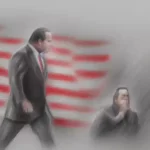This Could Pique Your Interest As Well:
The Supreme Court’s decision to hear Marcus Weldon’s case has reignited the debate on felons’ Second Amendment rights. Both sides of the argument present valid points.
To provide a contrasting viewpoint, those who support Weldon argue that he has served his time and has been law-abiding for over two decades. Thus, denying him the right to bear arms is an infringement on his Second Amendment rights. Additionally, this law can create a vicious cycle where felons are pushed further into the margins of society with limited legal options to defend themselves.
Still, opponents of Weldon’s case argue that convicted felons have demonstrated a disregard for the law and should not be trusted with firearms. They also highlight the fact that this law has been in place for many years and has not been a problem until now. Furthermore, the law is a justifiable and reasonable limitation on Second Amendment rights, as it promotes public safety by keeping guns out of the hands of potentially dangerous individuals.
Regardless of which side of the debate one falls on, it is important to note that the Supreme Court’s ruling has far-reaching consequences. It is not just about felons’ gun rights, but also about the power of states to limit the scope of constitutional rights. Ultimately, the court’s decision will set an important precedent regarding the balance between individual rights and public safety.
In my view, the Supreme Court should consider the specific details of each felon’s case before making a broad ruling. While I understand the value of promoting public safety, denying someone their Second Amendment rights should not be taken lightly. However, it is also important to note that not all felons are the same, and those who have committed violent crimes or have a history of violence should not have access to firearms.
In my opinion, the court should strike a balance by allowing felons with non-violent offenses who have demonstrated good behavior and rehabilitation over a period of time to have access to firearms. This would create an incentive for felons to act lawfully and reintegrate into society. However, for felons with violent offenses or a history of violence, the law should remain the same.
Overall, the debates on Second Amendment rights for felons are complex and involve balancing individual rights with public safety. I am hopeful that the Supreme Court will consider all sides of this issue before reaching a decision that will have significant ripple effects for gun laws and criminal justice reform in the United States.
Here's A Video We Thought You Might Also Like:
Author Profile

- I'm a science writer on a mission to make scientific discoveries accessible to everyone, and that includes exploring the political aspects of scientific research and policy-making.
Latest entries
 Breaking News2023.12.17Dumbfounding Revelation Former Florida State Representative Breaks Silence After Serving Prison Time
Breaking News2023.12.17Dumbfounding Revelation Former Florida State Representative Breaks Silence After Serving Prison Time Breaking News2023.12.15Jolting Revelation FBI’s Secret Surveillance of Catholics Exposed!
Breaking News2023.12.15Jolting Revelation FBI’s Secret Surveillance of Catholics Exposed! Breaking News2023.12.15Is Chris Christie the Bold Challenger the GOP Needs Critics Say No
Breaking News2023.12.15Is Chris Christie the Bold Challenger the GOP Needs Critics Say No Breaking News2023.12.14Senator’s Bold Move to Combat Antisemitism on College Campuses Sends Shockwaves – Will It Work
Breaking News2023.12.14Senator’s Bold Move to Combat Antisemitism on College Campuses Sends Shockwaves – Will It Work






